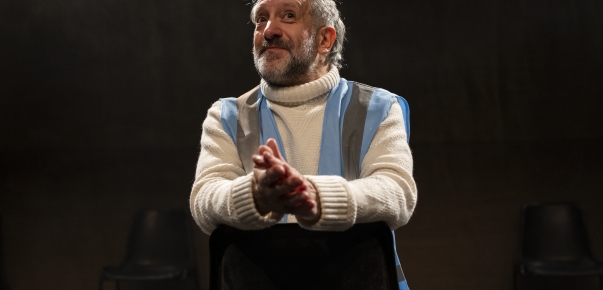An Interview with Marcelo Dos Santos, Writer of Complicite's Lionboy
29 May 2013Currently on attachment at the Royal Court Theatre in London, Marcelo Dos Santos is a young, award-winning playwright on the rise. In last few months he has been working with internationally renowned theatre company, Complicite, on their first family show, Lionboy. We caught up with him to ask about his role in creating the show.
[gallery type="slideshow" ids="176470036,176470035,176470034,176470033,176470032,176470031,176470030,176470013"]
Could you tell us a little about Lionboy?
Lionboy is about a boy, Charlie Ashanti, who can to talk to cats. This unique skill proves invaluable when his scientist parents are kidnapped and he has to cross the world to find them with the help of his cat friends, a circus and six lions. How has the creative process worked?I worked closely with Annabel Arden (Director of Lionboy) and Louisa Young (one half of Zizou Corder, author of the Lionboy trilogy) to shape the story and form. Once in rehearsals I collaborated with the actors to shade and colour the characters’ voices. It wasn’t strictly a devising process or a traditional stage adaptation either, and so a large part of the rehearsal period was spent working out ways in which the company could usefully interact with me as writer, and hopefully, how I could become a useful part of the company. Lionboy is an exciting and playful text with an epic storyline where the hero travels hundreds of miles sometimes by boat and sometimes in the company of lions, how have you faced these challenges?
Lionboy is a picaresque novel without a particularly clear unity of time and place, which makes it very difficult to adapt. Charlie very literally travels the world and the book is bursting with incident, novelistic digressions and an enormous cast of characters. We decided to focus primarily on Charlie’s adventures aboard the circus ship, Circe, and his final encounters with the Corporacy at their HQ. For us, the essence of the storytelling was about how Charlie navigated moral journeys rather than physical ones.
What do you think is at the core of Lionboy (both in the novel and in your adaptation)?
There are lots of potential ways into the book; Charlie’s bond with animals, the loss of home, the loss of parents but what was most striking to me about the novel, is how powerfully and playfully Zizou Corder writes about capitalism and privatisation. Like all good books for young people the intellectual questions are challenging. At its core, I think it’s about responsibility: our responsibility as individuals (and as a society) to challenge the status quo and effect change. What has been the biggest challenge?
Condensing the enormously complicated plot, isolating the key moments, and sticking to a ‘storytelling’ form, which is quite different from anything I’ve done before. What has been the biggest surprise?
Doing a full run at the end of the first week of rehearsals and then pretty much never again, until the first night in Bristol!What’s next for you?
I begin an attachment at the Royal Court Theatre in August, and I’m developing a new show with my company High Hearted Theatre.
Lionboy runs at Bristol Old Vic from 29 May-1 Jun. Find out more here.


